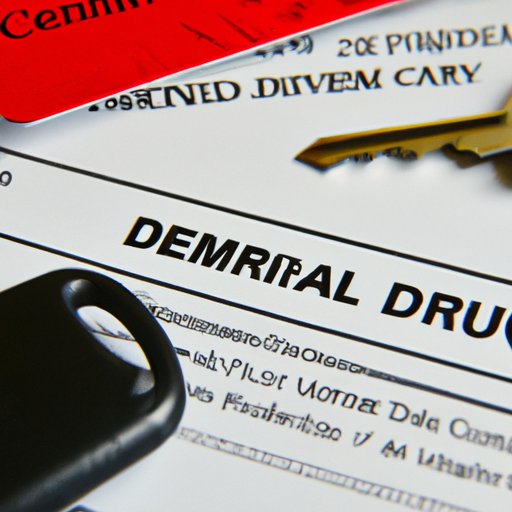
Introduction
Traveling to Canada with a DUI conviction can be a complicated and stressful process. However, it is important to know the entry requirements, legal ramifications, and tips for navigating the Canadian border to ensure a smooth trip. In this article, we will discuss everything you need to know about entering Canada with a DUI, as well as provide alternatives for safe travel.
Getting into Canada with a DUI: Understanding the Entry Requirements
If you have a DUI conviction, you may be deemed inadmissible to Canada and denied entry. In order to enter Canada with a DUI record, you must apply for a Temporary Resident Permit (TRP), which is a document that allows you to enter Canada for a specified period of time. The application requires a fee and can take several months to be processed. You will also need to submit paperwork, such as court documents and proof of rehabilitation.
The TRP is not a guarantee of entry and may be denied if the border officer determines you pose a risk to public safety or if your DUI conviction is recent. The application process can be complicated, so it is recommended to seek professional assistance, such as a lawyer or an immigration consultant, to ensure the process is done correctly.
Navigating the Canadian Border with a DUI: Tips and Tricks
When crossing the Canadian border with a DUI conviction, it is important to be prepared and knowledgeable about the process. Alternative travel routes, such as driving through a less busy border crossing, may be more suitable for individuals with a DUI record. It is also important to avoid common mistakes and pitfalls, such as providing false documents or inconsistent information, which can result in denial of entry or serious legal consequences.
Speaking with border officials can be nerve-racking, but it is important to be honest and transparent about your DUI conviction. Border officials have access to a variety of databases, including criminal records, and providing false information can result in serious legal consequences. It is recommended to carry necessary legal documents, such as court records and proof of rehabilitation, to help facilitate the entry process.
The Legal Ramifications of Entering Canada with a DUI
Attempting to enter Canada with a DUI conviction can result in serious legal consequences, including fines, detention or deportation, and long-term consequences for future travel and employment. Under Canadian law, DUI convictions are considered serious criminal offenses, which can result in permanent inadmissibility to Canada. In addition, even a single DUI conviction can affect your ability to obtain domestic and international visas in the future.
It is important to understand the long-term consequences of a DUI conviction and to explore alternative travel options to avoid risk and legal complications. Seeking professional assistance, such as legal advice or rehabilitation programs, can also help mitigate the consequences and move forward from a DUI record.
Can You Get a Pardon for a DUI and Enter Canada?
Applying for a criminal pardon, also known as a record suspension, may be an option for individuals seeking entry to Canada with a DUI conviction. A criminal pardon removes an individual’s criminal record, which can improve their eligibility for entry to Canada. However, the process can be lengthy and expensive, and there are eligibility requirements that must be met.
In order to be eligible for a pardon, the individual must have completed their sentence, including probation and fines, and remained crime-free for a designated period of time. The length of the waiting period depends on the seriousness of the offense. For a DUI conviction, the waiting period is typically at least five years after the completion of the sentence. Seeking professional assistance, such as legal advice or pardon services, can help ensure the application is done correctly and increase the likelihood of success.
Alternatives to Entering Canada with a DUI
Traveling to Canada without risking denial of entry due to a DUI record is possible through alternative travel options. Applying for a Temporary Resident Permit, which allows for a specified period of entry, or exploring other destination alternatives may be suitable for individuals with a DUI conviction. However, it is important to consider the potential challenges and issues that may arise when exploring alternative travel options, such as additional costs and time.
Conclusion
Entering Canada with a DUI conviction can be a complicated and stressful process. However, understanding the entry requirements, legal consequences, and alternatives for safe travel can help mitigate risk and ensure a smooth trip. Seeking professional advice and assistance is recommended to ensure the best possible outcome.





